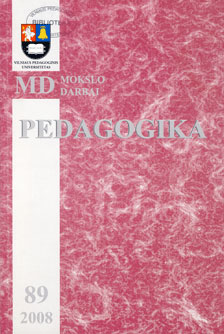Pagrindinės kompetencijos andragogo profesinėje veikloje
The basic competencies of andragog in the professional activities
Author(s): Aurimas Marijus JuozaitisSubject(s): Education
Published by: Vytauto Didžiojo Universitetas
Keywords: adult education; adult educator; andragog; competencies; competencies of adult educator.
Summary/Abstract: The article deals with the competencies of adult educator (andragog). The set of basic competencies is derived out of the analysis of major works of the researchers in the field and the studies of adult educator competencies, described in the works by practitioners. Conditions for education of adults described by M. Knowles, P. Jarvis, J. Mezirow, D. Kolb, S. Brookfield, D. Boud and D. Walker, R. Brockett and R. Hiemstra, K. Illeris are interpreted in the light of adult educator’s role in organizing and facilitating proper educational activities. The adult educator's (andragog s) role is structured in the form of competencies. The major concern of the analysis is focused upon the description of the adult educator's (andragog’s) competencies in as wide as possible way in order to cover the basics of adult education. The analysis of practitioners and researchers approach towards adult educator's (andragog's) competencies itself is also presented in this paper. The studies of M. Knowles, D. Mocker and E. Noble, D. Kamp, P. Jackson, L. Rae, S. Bjerkaker and the team, M. Teresevičienė, |G. Gedvilienė and V. Zuzevičiūtė are examined. The competencies described in those studies are compared with those derived out of the conditions for adult education and supplementary characteristics are added to the set of already compiled competencies set. Out of the both analysis the set of twelve competencies is derived. The set covers competencies which are divided into two major blocks: the competencies of personal traits and the competencies of professional knowledge and skills in preparing, running and supporting ongoing personal and professional growth of adult learners. The personal traits' competencies cover such characteristics as: self-esteem; tolerance; flexibility; responsibility; empathy; communication skills. The competencies of professional knowledge and skills are such: knowledge about how adults learn and understanding the psychology of adults; knowledge of methods in adult education; planning and organizational skills; good knowledge of the subject; ability to motivate for learning; skills in self-reflection and critical thinking. The paper stresses the importance of adult educator's personality. For this reason the half of the competencies set is dealing with the personal traits and just the rest of professional knowledge and skills.
Journal: Pedagogika
- Issue Year: 2008
- Issue No: 89
- Page Range: 52-57
- Page Count: 5
- Language: Lithuanian

